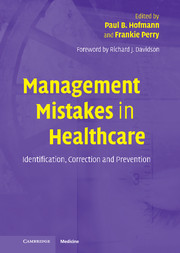Book contents
- Frontmatter
- Contents
- Notes on the contributors
- Foreword
- Preface
- Acknowledgments
- Part I Addressing management mistakes in healthcare
- 1 Acknowledging and examining management mistakes
- 2 The context of managerial mistakes
- 3 Identifying, classifying, and disclosing mistakes
- 4 What medical errors can tell us about management mistakes
- 5 Correcting and preventing management mistakes
- 6 A question of accountability
- Part II Case studies of mistakes in healthcare management
- Suggested further reading
- Index
- References
1 - Acknowledging and examining management mistakes
Published online by Cambridge University Press: 12 October 2009
- Frontmatter
- Contents
- Notes on the contributors
- Foreword
- Preface
- Acknowledgments
- Part I Addressing management mistakes in healthcare
- 1 Acknowledging and examining management mistakes
- 2 The context of managerial mistakes
- 3 Identifying, classifying, and disclosing mistakes
- 4 What medical errors can tell us about management mistakes
- 5 Correcting and preventing management mistakes
- 6 A question of accountability
- Part II Case studies of mistakes in healthcare management
- Suggested further reading
- Index
- References
Summary
The failed merger of the hospitals owned by Stanford University and the University of California at San Francisco cost both institutions a combined financial loss of $176 million over a twenty-nine-month period (Russell 2000), but the non-financial costs remain immeasurable. Like all aborted mergers, it was originally well intentioned. However, unlike most mistakes, the failure was highly scrutinized and publicized.
Although the examination of medical errors in the USA was greatly accelerated by the Institute of Medicine (1999) report, To Err Is Human: Building a Safer Health System, and physicians have urged colleagues to acknowledge mistakes for years (Hilfiker 1984), the healthcare literature has rarely addressed or even acknowledged executive mistakes.
Unsuccessful consolidations, as well as the apparent inability of other mergers to achieve cost-saving targets (Costello 2000), have contributed to a continuing perception that healthcare resources should be better managed. In part, such problems have caused a deterioration of public trust in hospitals, but this erosion has been under way for some time (Hofmann 1991). Ultimately, a reduction in management mistakes should lead to greater public trust, stronger executive performance, improved financial results, enhanced quality of patient care, and higher staff morale. It is difficult to imagine a more compelling set of incentives for aggressively pursuing an analysis and reduction in management mistakes.
- Type
- Chapter
- Information
- Management Mistakes in HealthcareIdentification, Correction, and Prevention, pp. 3 - 27Publisher: Cambridge University PressPrint publication year: 2004
References
- 1
- Cited by



